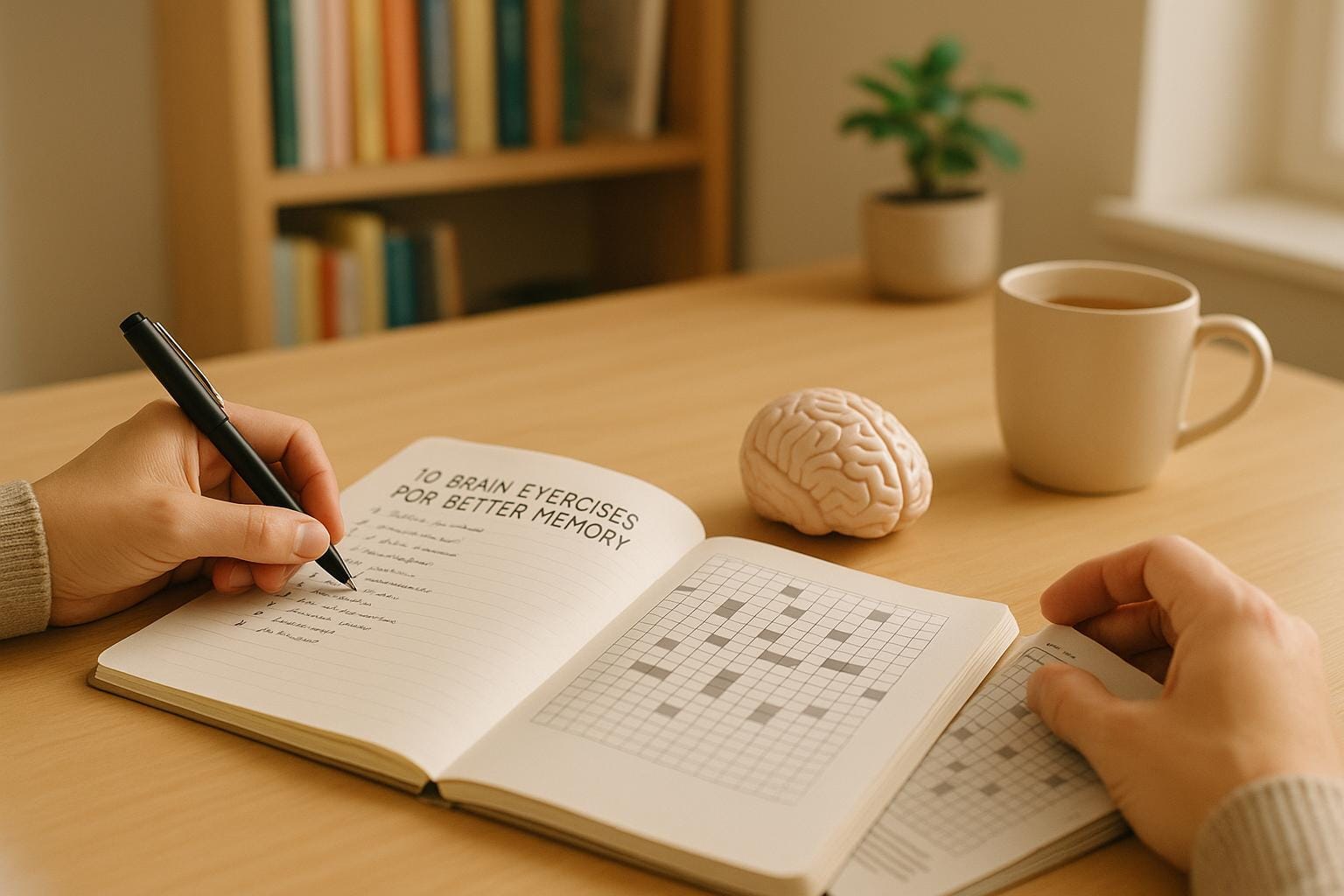Ashwagandha, an Ayurvedic herb, is widely used to help manage stress and improve focus. Research highlights that the ideal dosage depends on your specific goals, ranging from reducing anxiety to boosting cognitive performance. Here’s a quick summary:
- Stress Relief: 250–600 mg daily for at least 8 weeks is effective in reducing cortisol levels and improving sleep.
- Cognitive Support: 300–600 mg daily over 30–90 days improves memory, reaction time, and focus. A single 400 mg dose may provide short-term cognitive benefits.
- Consistency: Benefits are typically noticeable after 4–12 weeks of regular use.
- Safety: Start with a low dose (e.g., 300 mg/day) and increase gradually to avoid side effects such as digestive issues or drowsiness.
Always consult a healthcare provider before starting ashwagandha, especially if you have pre-existing conditions, are pregnant or breastfeeding, or take medications. Proper dosage and timing can maximize its benefits while minimizing risks.
Recommended Dosages for Stress Reduction
Daily Dosage Range
Research suggests that taking 250–600 mg of ashwagandha daily can help manage stress and anxiety effectively. Higher doses, such as 600 mg per day, have been linked to significant improvements in anxiety reduction and sleep quality. While lower doses, starting at 120 mg, have shown some benefits, the most consistent results for long-term stress relief come from doses in the 500–600 mg range. These are often split into two 300 mg doses taken throughout the day. A 2021 review of clinical trials further supported these findings, highlighting reductions in stress, anxiety, fatigue, and cortisol levels with regular use.
How Long to Take for Best Results
Consistency is key when it comes to experiencing the full benefits of ashwagandha. Most studies recommend taking it for at least one month, with optimal results often seen after 8 to 12 weeks of consistent supplementation. For instance, one study found that 600 mg daily for eight weeks significantly reduced anxiety and improved sleep in individuals under stress. Experts often advise continuing supplementation for at least three months to fully evaluate its effectiveness. Additionally, some recommend taking a break after six months of continuous use to maintain its benefits over time.
"Many of my patients say it makes them feel calmer and they're able to sleep better."
- Jessica Henning, APRN-CNP, Nurse Practitioner, Ohio State Wexner Medical Center
Special Considerations for Stress Relief
The ideal dosage can vary depending on individual factors such as age, overall health, medications, and metabolism. Starting with a lower dose and gradually increasing it while monitoring for side effects is a sensible approach. If you have a chronic condition or take medications that could interact with ashwagandha, consult a healthcare provider before starting supplementation.
"Taking ashwagandha will not make the stress go away, but it may help reduce the symptoms so one feels more at ease... But if you take the time to develop coping tools to help manage stress in the future, that will go much further in the long run."
- Yufang Lin, MD, Integrative Medicine Specialist, Cleveland Clinic
Pregnant or breastfeeding individuals should always consult a healthcare provider before using ashwagandha. Its use is also not generally recommended for children or adolescents without professional supervision. To ensure safety and effectiveness, choose supplements that have undergone independent testing and verification. Always follow the dosing instructions provided on the product label.
This article is for informational purposes only and is not intended as medical advice. Please consult a healthcare professional before starting any new supplement regimen.
Dosage Guidelines for Improving Focus and Cognitive Performance
Dosage for Short-Term Cognitive Benefits
A single 400 mg dose of ashwagandha extract has been shown to quickly enhance working memory and reaction times. In a 2022 study published in the International Journal of Environmental Research and Public Health, researchers tested this dosage on 13 healthy adults. The participants demonstrated improvements in working memory and maintained reaction times during cognitive tests such as the Berg–Wisconsin Card Sorting, Go/No-Go, Sternberg Task, and Psychomotor Vigilance Task tests.
"Present findings provide the first clinical evidence that acute supplementation with ashwagandha (Withania somnifera) in healthy human subjects improves certain aspects of cognitive performance, including enhancing sustained attention and increasing short-term/working memory." - D. Xing et al.
This single-dose option is ideal for situations where you need a quick mental boost, like preparing for an exam, giving a work presentation, or tackling other mentally demanding tasks. For those seeking more consistent cognitive support, consider a long-term approach.
Dosage for Long-Term Cognitive Improvement
Daily doses between 225–400 mg over 30 days have been linked to better cognitive flexibility, visual memory, reaction time, psychomotor speed, and executive functioning.
For more substantial improvements, studies suggest taking 300 mg of sustained-release ashwagandha daily for 90 days. This regimen has been associated with significant gains in memory, attention, and processing speed. Similarly, another study noted that 50 adults who took 600 mg of ashwagandha extract daily for 8 weeks experienced marked enhancements in these areas.
"Treatment with one Ashwagandha SR capsule once daily for 90 days improved memory and focus, psychological well-being, and sleep quality, reduced stress levels, and was safe and well-tolerated." - Kumarpillai Gopukumar et al.
While some benefits may be noticeable after 8 weeks, the most pronounced results typically occur after 90 days of consistent use.
This article is for informational purposes only and is not intended as medical advice. Please consult a healthcare professional before starting any new fitness or wellness routine.
Best Practices for Ashwagandha Supplementation
Timing and Consistency
When it comes to ashwagandha, timing and consistency can make a big difference in how well it works for you. If you're looking to boost energy, reduce stress, or improve focus, taking it in the morning might be your best bet. On the other hand, if relaxation or better sleep is your goal, an evening dose could be more effective. While you don’t need food for ashwagandha to work, taking it with a meal can help if it upsets your stomach .
"Ashwagandha can be taken any time of the day, with or without food." - Azza Halim, MD, Board-Certified Physician
It’s a good idea to monitor how your body reacts over the first few days. If you feel overly energized or drowsy, tweak your timing accordingly. Everyone’s body responds differently, so finding the right schedule might take a little trial and error.
"For some, initial energy boosts suggest trying it earlier in the day to assess your response." - Olivia Amitrano, Herbalist and Founder of Organic Olivia
Above all, consistency is key. Whether you take it with your morning coffee or as part of your evening routine, sticking to a regular schedule helps maintain stable levels of ashwagandha in your system.
Monitoring Progress and Adjusting Dosage
Once you’ve settled on a timing that works, keep track of how your body responds. Ashwagandha isn’t a quick fix - it might take several days or even weeks to notice improvements in stress levels or mental clarity. If you experience stomach discomfort, consider taking it with food or switching to an evening dose.
This article is for informational purposes only and is not intended as medical advice. Please consult a healthcare professional before starting any new fitness or wellness routine.
Potential Side Effects and Safety Precautions
Common Side Effects
While ashwagandha is often well-tolerated, some people may experience mild side effects. These can include digestive issues like stomach irritation, nausea, or diarrhea, as well as drowsiness, headaches, or, in rare cases, allergic reactions. For instance, one study found that 6.7% of participants reported digestive discomfort, while 3.3% experienced drowsiness. If drowsiness occurs, it’s best to avoid driving or operating heavy machinery.
Severe side effects are rare but can include liver toxicity or even liver failure, particularly in individuals with pre-existing liver conditions.
"There is increasing recognition of herb-induced liver injury associated with ashwagandha, particularly with prolonged use."
- Daniel T. Abazia, PharmD, BCPS, CPPS, clinical associate professor at the Ernest Mario School of Pharmacy at Rutgers Health
"Patients with pre‑existing chronic liver disease are at highest risk for developing serious adverse effects, including herb‑induced liver injury, with long‑term or high‑dose use of ashwagandha supplements."
- Daniel T. Abazia, PharmD, BCPS, CPPS, clinical associate professor at the Ernest Mario School of Pharmacy at Rutgers Health
To minimize the chance of side effects, starting with a small dose and gradually increasing it may help your body adapt. If any side effects worsen or persist, consult a healthcare professional immediately.
When to Consult a Healthcare Provider
Before incorporating ashwagandha into your routine, it’s crucial to consult a healthcare provider - especially if you have a thyroid condition, autoimmune disease, liver issues, or if you’re pregnant or breastfeeding. The herb may interact with medications for diabetes, high blood pressure, thyroid disorders, immunosuppressants, sedatives, anti-seizure drugs, or antidepressants.
Be vigilant for signs of liver problems, such as yellowing of the skin or eyes, dark urine, or severe fatigue, and discontinue use if these symptoms occur. Similarly, allergic reactions like a rash, swelling, or difficulty breathing require immediate medical attention. Also, watch for symptoms of low blood sugar or blood pressure, as ashwagandha can influence these levels.
Ashwagandha is not recommended for individuals with hormone-sensitive prostate cancer, as it may raise testosterone levels. Those preparing for surgery should stop using the herb in advance, as it can affect blood sugar and blood pressure during procedures. Additionally, if you’re taking benzodiazepines, anticonvulsants, or barbiturates, ashwagandha may cause excessive sedation. People on immunomodulatory drugs should also seek medical advice due to potential interactions with immune function.
This article is for informational purposes only and is not a substitute for professional medical advice. Always consult with a healthcare provider before starting any new wellness or fitness regimen.
The Unique Benefits of ASHWAGANDHA (How and When to Take it) - Dr. Berg Explains
Conclusion and Key Takeaways
Finding the right ashwagandha dosage depends on your specific goals, whether you're aiming to reduce stress or enhance mental clarity. Research suggests 300–600 mg daily for cognitive support and 500–600 mg daily for stress relief. If you're seeking help with sleep, higher doses - 600 mg or more - might be more effective.
The best approach? Start low and go slow. Begin with a modest dose, such as 300-500 mg per day, to see how your body responds. From there, you can gradually increase by 100-200 mg weekly if needed. This gradual method helps your body adjust while reducing the chance of side effects.
Most studies indicate that the benefits of ashwagandha become noticeable after 4–12 weeks of consistent use. Patience is key - give your body the time it needs to adapt before making any changes to your dosage. This steady approach ensures you can experience the full range of benefits safely.
"Ultimately, the goal is to improve our lifestyles so we're able to responsibly minimize our need for supplements and medications. Using supplements short term gets you back on track so your body can get back to the business of healing itself." - Ryan Barish, M.D., Functional Medicine Specialist, Henry Ford Health
During the first few weeks, keep an eye out for any side effects and address concerns with a healthcare professional. While ashwagandha is generally safe for short-term use (up to three months), long-term safety data is still limited.
If you have existing health conditions or take other medications, it's essential to consult your healthcare provider. They can help you navigate potential interactions and determine the right dosage based on your medical history.
When used as part of a well-rounded wellness plan, ashwagandha can be a helpful ally in managing stress and improving focus. By following evidence-based guidelines and prioritizing safety, you can enjoy its benefits while minimizing risks.
This article is for informational purposes only and does not replace professional medical advice. Always consult a healthcare provider before starting any new fitness or wellness routine.
FAQs
What are the benefits of ashwagandha for stress relief and focus?
Ashwagandha is celebrated for helping the body cope with stress by lowering cortisol levels - a hormone closely tied to stress. By reducing cortisol, it can ease anxiety and encourage a calmer state of mind.
Beyond stress relief, ashwagandha is also linked to improved mental clarity and focus. Research indicates it may enhance memory, support better sleep, and elevate overall cognitive function. These qualities have made it a go-to adaptogen for reducing stress while boosting productivity and mental health.
What are the possible side effects of ashwagandha, and how can I reduce the risks?
Ashwagandha is known to be well-tolerated by most, but some individuals might encounter side effects such as drowsiness, stomach upset, nausea, diarrhea, headaches, or even allergic reactions. On rare occasions, it could impact liver health or thyroid function.
To stay on the safe side, it's important to follow the recommended dosage. Avoid using ashwagandha if you're pregnant, breastfeeding, or without consulting a healthcare provider - especially if you're on medications or have existing health conditions. Starting with a smaller dose and gradually increasing it can also help lower the chances of experiencing side effects.
Can I take ashwagandha if I’m on medication or have a health condition?
If you're on any medication or managing a health condition, make sure to talk to your healthcare provider before using ashwagandha. This herb can interact with medications like those for thyroid conditions, blood sugar regulation, blood pressure, sedatives, or immunosuppressants, potentially altering their effectiveness.
People with autoimmune disorders, thyroid problems, liver conditions, or those planning for surgery should be particularly careful. To stay safe, always seek personalized guidance from a medical professional before incorporating ashwagandha into your routine.












